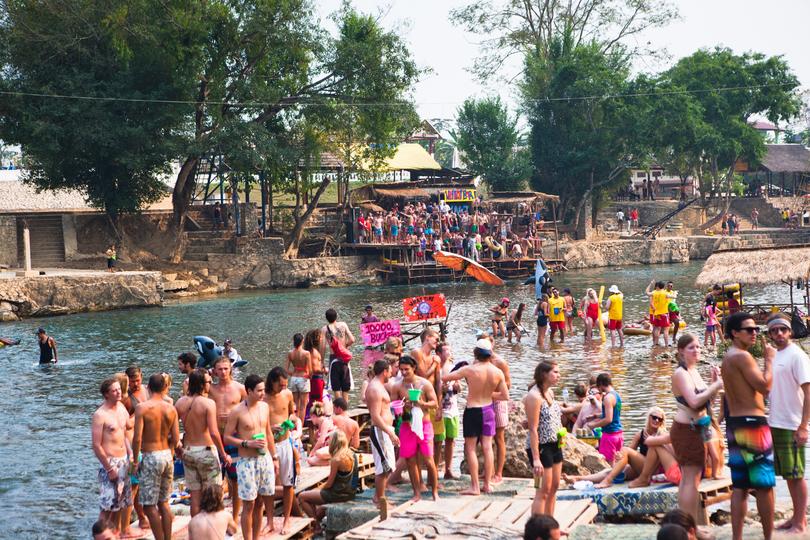KATE EMERY: Depriving our kids of travel for fear of what might happen would be a tragedy of a different kind
KATE EMERY: Protecting our kids from the many dangers of the world would also mean preventing them from experiencing all of its beauty and wonder.

Every parent whose child has gone travelling without them will have played out the scenario in their mind.
The late night phone call.
The scramble for flights.
Sign up to The Nightly's newsletters.
Get the first look at the digital newspaper, curated daily stories and breaking headlines delivered to your inbox.
By continuing you agree to our Terms and Privacy Policy.The rush to their side.
The worst news imaginable.
And then, impossibly, the emotional and logistical horror of bringing home the body of a child who was supposed to bury you in a future too distant to be imaginable.
For the families of Bianca Jones and Holly Bowles, the two Melbourne teenagers and friends who died from methanol poisoning while travelling in Laos, the hypothetical is their reality. Ms Jones and Ms Bowles are among six to have died from suspected methanol-tainted drinks served in the popular party town of Vang Vieng.
Their stories have been reported widely not just because the pair were young, beautiful and loved but because it taps into the worst nightmare of any parent who has waved their child off at the airport with a stone the size of Uluru in their stomach.
But Australian parents of teenagers whose response to this tragedy is to stock up on bubble wrap and cotton wool, the better to swathe their child in a protective ball until they’re old enough to use the phrase “in my day”, should think again.

Travelling overseas without parents is a rite of passage.
In Ancient Rome the transition from child to adult might be marked, for boys at least, by giving them a “toga virilis” and a public shaving.
In Australia, they get a Samsonite and a lift to the airport.
The risks are real but the risks are part of what makes it so valuable — and not just for the kids.
For young people, solo travel forces them to take responsibility for themselves and can offer an education in another culture, the art of reading a train timetable and learning just how far $100 can stretch if you’re comfortable sharing a shower with both cockroaches and a stranger with an aggressive foot fungus.
Experts love to talk about how solo travel can build resilience and independence in young people, all of which I’m sure is true.
But there’s also the simpler truth that these trips, taken on the cusp of adulthood, can also be a fun, messy, friendship-cementing time, the memories of which will light something warm inside when you’re back home and wading through the mundanity of life, with all the work, study and bills that implies.
For parents, watching their adult child take a trip can force them to acknowledge their child’s autonomy and accept that their 18-year-old may have needs that can no longer be met with a dummy and a nappy change. It’s a moment akin to that of an adult bird who has to one day let their puff of feathers and bone jump off a high branch and hope they learn to fly before they hit the ground.
Most birds don’t one day nudge their chicks into the air without some kind of preparation, just as most parents wouldn’t think of sending their child overseas without all the usual warnings about pickpockets, watching their drinks and why they’re getting the damn travel insurance. The risk of poisoning from methanol, which in South-East Asia is sometimes used as a cheaper alternative to ethanol in bootleg alcohol or added to drinks in dodgy bars, will surely be added to that list for any young Aussies travelling any time soon.
There is, however, a difference between warning young travellers about the risks, in the hope they might avoid them, and locking them in their bedroom until they’re menopausal.
Psychologist Marny Lishman said news stories about overseas tragedies naturally made many would-be travellers second guess their plans.
“This is even more relevant for parents who are watching their similar-aged children organising trips overseas for their trips of a lifetime,” she said.
“When such tragedies occur our brain uses a cognitive shortcut to make decisions — this means it uses the most available information to make a decision — which, given the latest news reports, might lead parents to stop their kids going on these types of holidays with their friends for fear of something similar happening.
“But in doing this the brain doesn’t account for the likelihood of this not happening, that it’s statistically more likely that our kids will be safe and that there are so many benefits for our teens/young adults traveling the world.
“Unfortunately tragedies do happen on holidays, but they also happen in our home town too in everyday life, so we need to realise that our brain will try and overprotect the ones we love but. . . balance that out with what is also best for our children with the bigger picture.”
In other words: travelling overseas is a risk but so is getting out of bed in the morning.
The deaths of Ms Jones and Ms Bowles, young women with their lives ahead of them, is a tragedy.
Depriving other young people of the chance to explore the world, for fear of the phone call that might come in the night, would be a tragedy of a different kind.
